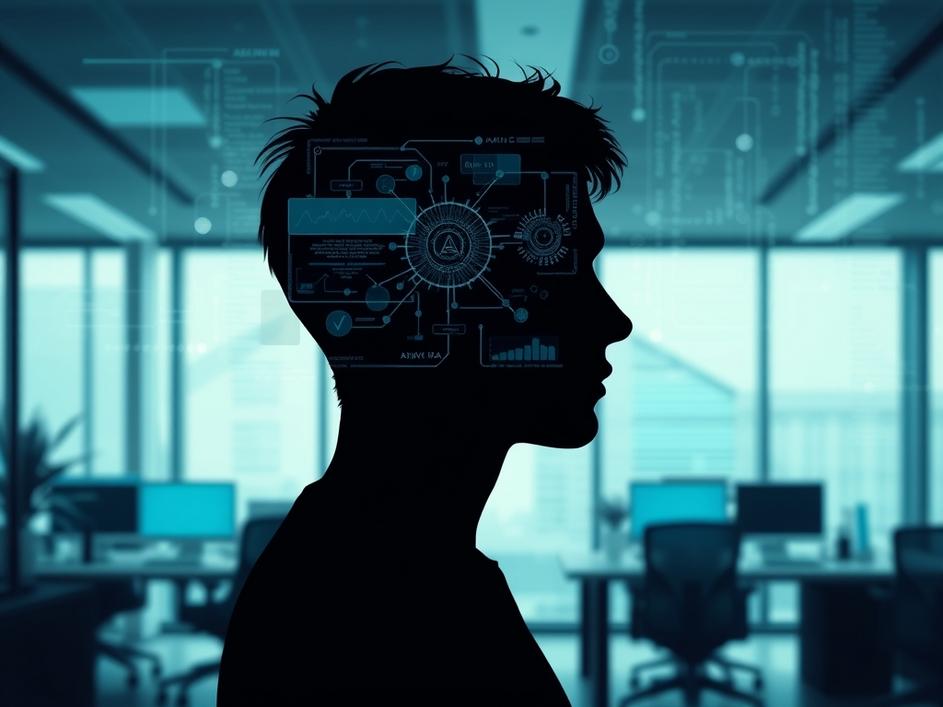


We are a digital agency helping businesses develop immersive, engaging, and user-focused web, app, and software solutions.
2310 Mira Vista Ave
Montrose, CA 91020
2500+ reviews based on client feedback

What's Included?
ToggleLately, it feels like we’re constantly hearing about big companies, even giants like Amazon, making changes to their teams. When these headlines pop up, our minds often jump to things like the economy, interest rates, or maybe even a post-pandemic recalibration. And while those reasons are absolutely real and play a big part, there’s another, more subtle force at play, one that’s quietly but steadily reshaping the very fabric of how we work. It’s a conversation that’s been brewing for a while, but it feels like the volume just got turned up. We’re talking about Artificial Intelligence, and its role in how companies manage their workforce, especially when it comes to roles we once thought were pretty safe – the white-collar jobs.
When a company as massive and innovative as Amazon announces workforce adjustments, it’s always big news. Sure, they’re navigating a complex business world, just like everyone else. But what if these decisions aren’t just about cutting costs or streamlining operations in the traditional sense? What if, beneath the surface, AI tools are becoming so good, so efficient, that they’re starting to take on tasks that humans used to do? Not just simple, repetitive jobs, but tasks that involve analysis, writing, even some aspects of coding or customer service. If a cutting-edge company like Amazon can find ways to achieve the same output with fewer human hands thanks to smart technology, it signals a significant shift. It asks us to look beyond the immediate reasons for layoffs and consider the deeper, technological currents that are influencing these choices across industries.
For a long time, AI felt like something out of science fiction. Then it was cool chatbots and smart speakers. But now, it’s different. AI has grown up. It’s not just a fancy toy; it’s a practical tool that businesses are really using. Think about it: AI can draft emails, summarize lengthy reports, analyze huge datasets in seconds, and even generate marketing content. These aren’t minor tasks; they’re the bread and butter of many white-collar roles. Companies are seeing the potential for increased efficiency and reduced overhead. This isn’t about robots taking over the world; it’s about intelligent software taking over specific, defined tasks that were once exclusively human territory. And the speed at which these capabilities are advancing is truly remarkable, far outpacing many predictions from just a few years ago.
What’s particularly striking about this moment is not just *that* AI is impacting jobs, but *how fast* it’s happening. Experts have been talking about AI’s potential to automate tasks for years, but the timeline seems to have compressed dramatically. It’s like we expected a slow, steady trickle, and suddenly it feels like a rapid pour. This accelerated pace means that individuals and businesses need to adapt much faster than anticipated. The idea that certain professional roles were ‘safe’ or ‘AI-proof’ is being challenged. We’re in a period where skills that were valuable yesterday might be augmented or even replaced by AI tomorrow. This isn’t a doomsday scenario, but it is a wake-up call to acknowledge the rapid evolution and to think proactively about what human skills will be most valuable in a world where AI handles a growing share of cognitive tasks.
So, if AI is taking on more and more tasks, what does that leave for us? This is the crucial question, and it’s where our unique human strengths truly shine. AI is fantastic at processing information and executing defined tasks, but it lacks genuine creativity, complex emotional intelligence, ethical judgment, and the ability to build deep, meaningful relationships. It can’t truly innovate or feel empathy. Our role in this evolving landscape becomes less about routine execution and more about strategic thinking, problem-solving in ambiguous situations, fostering human connection, and dreaming up new ideas that AI can then help us bring to life. It’s about working *with* AI, not against it, leveraging its strengths to free us up for higher-level contributions that only humans can make.
The current buzz around companies like Amazon and the role AI plays isn’t just a fleeting news story; it’s a sign of a fundamental shift in the job market. This isn’t necessarily an ‘apocalypse,’ but it is a powerful catalyst for change. It means we all need to be students again, continuously learning and adapting. For individuals, it’s about identifying uniquely human skills and finding ways to integrate AI into our workflows to become more effective. For businesses, it’s about understanding how to responsibly harness AI to drive growth while also investing in their human talent. The future of work isn’t about humans vs. AI; it’s about how humans and AI can collaborate to build a more innovative and productive world. It’s a journey, and we’re all in it together, figuring out the path as we go.



Comments are closed